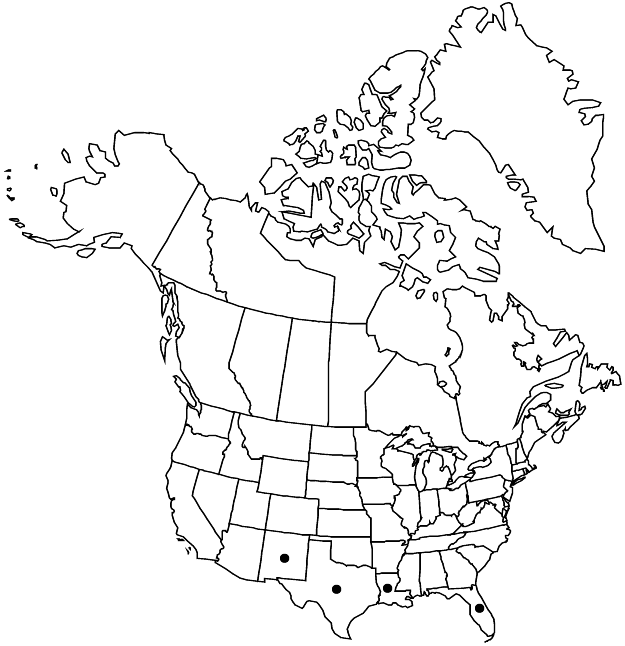Difference between revisions of "Stellaria cuspidata"
Ges. Naturf. Freunde Berlin Mag. Neuesten Entdeck. Gesammten Naturk. 7: 196. 1816.
FNA>Volume Importer |
RevisionBot (talk | contribs) m (Bot: Adding category Revised Since Print) |
||
| (5 intermediate revisions by 3 users not shown) | |||
| Line 12: | Line 12: | ||
|name=Alsine cuspidata | |name=Alsine cuspidata | ||
|authority=(Willdenow ex Schlechtendal) Wooton & Standley | |authority=(Willdenow ex Schlechtendal) Wooton & Standley | ||
| + | |rank=species | ||
}} | }} | ||
|hierarchy=Caryophyllaceae;Caryophyllaceae subfam. Alsinoideae;Stellaria;Stellaria cuspidata | |hierarchy=Caryophyllaceae;Caryophyllaceae subfam. Alsinoideae;Stellaria;Stellaria cuspidata | ||
| Line 23: | Line 24: | ||
-->{{Treatment/Body | -->{{Treatment/Body | ||
| − | |distribution= | + | |distribution=Fla.;La.;N.Mex.;Tex.;Mexico;Bermuda;South America. |
|discussion=<p>Subspecies 2 (2 in the flora).</p><!-- | |discussion=<p>Subspecies 2 (2 in the flora).</p><!-- | ||
--><p>Petal length, along with sepal and capsule size and shape, vary in the two subspecies. Although they appear to be distinct in the southern United States, in Mexico where their ranges overlap, plants of uncertain identification are frequently encountered.</p> | --><p>Petal length, along with sepal and capsule size and shape, vary in the two subspecies. Although they appear to be distinct in the southern United States, in Mexico where their ranges overlap, plants of uncertain identification are frequently encountered.</p> | ||
| Line 48: | Line 49: | ||
-->{{#Taxon: | -->{{#Taxon: | ||
name=Stellaria cuspidata | name=Stellaria cuspidata | ||
| − | |||
|authority=Willdenow ex Schlechtendal | |authority=Willdenow ex Schlechtendal | ||
|rank=species | |rank=species | ||
| Line 55: | Line 55: | ||
|basionyms= | |basionyms= | ||
|family=Caryophyllaceae | |family=Caryophyllaceae | ||
| − | |distribution= | + | |distribution=Fla.;La.;N.Mex.;Tex.;Mexico;Bermuda;South America. |
|reference=None | |reference=None | ||
|publication title=Ges. Naturf. Freunde Berlin Mag. Neuesten Entdeck. Gesammten Naturk. | |publication title=Ges. Naturf. Freunde Berlin Mag. Neuesten Entdeck. Gesammten Naturk. | ||
|publication year=1816 | |publication year=1816 | ||
|special status= | |special status= | ||
| − | |source xml=https:// | + | |source xml=https://bitbucket.org/aafc-mbb/fna-data-curation/src/2e0870ddd59836b60bcf96646a41e87ea5a5943a/coarse_grained_fna_xml/V5/V5_213.xml |
|subfamily=Caryophyllaceae subfam. Alsinoideae | |subfamily=Caryophyllaceae subfam. Alsinoideae | ||
|genus=Stellaria | |genus=Stellaria | ||
| Line 66: | Line 66: | ||
}}<!-- | }}<!-- | ||
| − | -->[[Category:Treatment]][[Category:Stellaria]] | + | --> |
| + | |||
| + | [[Category:Treatment]] | ||
| + | [[Category:Stellaria]] | ||
| + | [[Category:Revised Since Print]] | ||
Latest revision as of 17:10, 6 November 2020
Plants annual; taproot slender. Stems decumbent, much-branched, 4-sided, 15–70 cm, softly glandular-pubescent. Leaves petiolate (proximal) or sessile (distal), flaccid; blade ovate to deltate, 1–4.5 cm × 6–28 mm, base cordate, truncate, or rarely abruptly rounded, margins entire, apex acuminate, glabrous, rarely ciliate on margins. Inflorescences terminal, (3–)5–35-flowered cymes; bracts sessile, foliaceous, lanceolate to ovate, 3–30 mm, distally reduced. Pedicels ascending to spreading, sometimes deflexed in fruit, slender, 5–20(–30) mm, softly glandular. Flowers 3–8 mm diam.; sepals 5, with prominent midrib, lanceolate to ovate-lanceolate, 4–5 mm, to 8 mm in fruit, margins narrow, scarious, apex acuminate, blunt, pubescent on midrib, ± ciliate on margins; petals 4–5, 2–8 mm, shorter than to 2 times as long as sepals, blade apex deeply emarginate with 2 narrow lobes; stamens 3–8; styles 3, ascending, outwardly curved, 1.5–3 mm. Capsules green, transparent, ovoid, 4–6 mm, ± equaling sepals, apex obtuse, opening by 6 valves, recurved at tip; carpophore absent. Seeds reddish brown, round, 1–1.2 mm diam., covered with prominent, stalked glands. 2n = 26, 52.
Distribution

Fla., La., N.Mex., Tex., Mexico, Bermuda, South America.
Discussion
Subspecies 2 (2 in the flora).
Petal length, along with sepal and capsule size and shape, vary in the two subspecies. Although they appear to be distinct in the southern United States, in Mexico where their ranges overlap, plants of uncertain identification are frequently encountered.
Selected References
None.
Key
| 1 | Petals 5-8 mm, 1.5-2 times as long as sepals; sepals narrowly lanceolate, apex acuminate, 7-8 mm in fruit; montane | Stellaria cuspidata subsp. cuspidata |
| 1 | Petals 2-4 mm, equaling or shorter than sepals; sepals ovate-lanceolate, 4-5 mm in fruit; lowlands | Stellaria cuspidata subsp. prostrata |